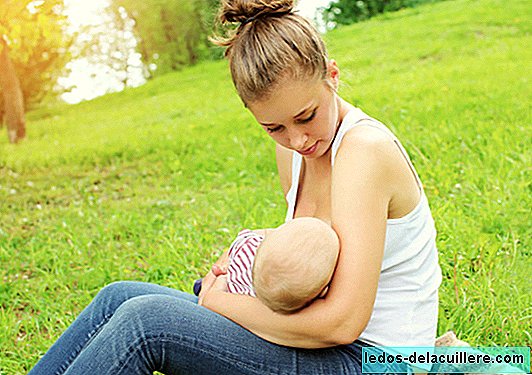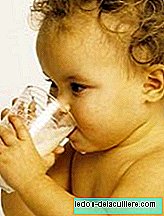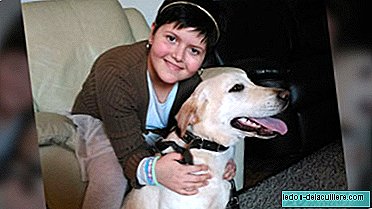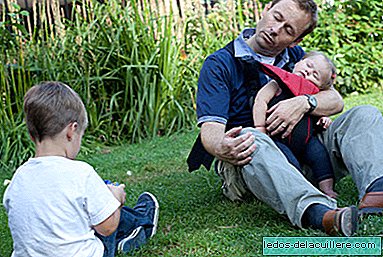As you all will know, breast milk is the best food a baby can receiveAnd, in fact, breastfeeding is the most logical way to feed it, if we take into account that the breast is a specific milk for human babies and that, in addition, it is a specific milk of each mother for her baby. It is because, among other things, it helps the baby to develop properly once it is born and to continue receiving defenses.
Breast milk helps breastfed babies to develop their intelligence a little more than if they do not breastfeed, although this is information that is often considered controversial (and often painful for those who do not breastfeed), although there are other factors that affect intelligence much more than breastfeeding, as the economic and social environment, for example.
Are breastfed children smarter?
Surely on more than one occasion you have heard this phrase as a defense of breastfeeding: breastfeeding children are smarter. Well, if we take all breastfed children to one side, and all non-breastfed children to another, and we do a study, it is possible that it can be shown that the average in intelligence tests is a little higher in children breastfed But that does not mean that a breastfed child is smarter than non-breastfed children, because this is not true.
In other words: there are many children who have never tried breast milk that are smarter than many breastfed children. And the reason is the same that I come to explain in the post: intelligence depends on many other things, in addition to the milk a baby takes at birth.

But anyway, let's see what the evidence says about breast milk and intelligence:
- A review of studies conducted in 2015, which analyzed all studies investigating the relationship of breast milk with intelligence, concluded that breastfed children have 2.62 to 3.44 points more than IQ than the non-breastfed.
- Another review of studies published this year 2017 suggests that in preterm infants, breastfeeding has effects throughout childhood and even adolescence, with breastfeeding time and the amount of breast milk received being an important factor: the more time and quantity, the greater the effect.
What does this mean? Well, what I have said above: a breastfed child is a little smarter than if he were not breastfed, but not necessarily smarter than non-breastfed children. Come on, that I, who barely took a tit, I would be a little smarter if my mother had breastfed me longer. What would make me different? Well I do not know, but probably the difference would be quite negligible, if we are talking about 2 to 3 points in the intellectual quotient.
How a baby's environment affects intelligence
It is very good that as a society we advocate to promote and defend the breastfeeding of babies and women so that every woman who wants to breastfeed can do it as she wants and when she wants, without value judgments or pressures; but this does not mean that as a society, and especially governments, they must also ensure other things, such as the conditions in which many children grow and develop.
And it is that children's intelligence is largely determined by the place where they are born, or what is the same, for the family in which they are born.

This graph, which is part of a study that we mentioned a while ago, clearly shows. If you look, it is telling us what is the intellectual quotient (IQ) of adults based on the time they were breastfed. The more months a person takes the breast, the higher the intellectual quotient (seeing the graph from left to right).
Now, what happens if we look at the graph from top to bottom? We see a green rhombus (children of families that charge less), a blue square (children of families that charge a little more), and a pink triangle (children of families that charge more). Thus, we observe that the difference in intellectual quotient of the subjects studied was much higher when comparing parents' salaries, which when comparing the type of breastfeeding they did.
If the difference between breastfed and non-breastfed is about 2-3 points, the difference between those who charge more and those who charge less becomes up to 13 points.
Thus, if we compare a baby who does not breastfeed born in a family of a high economic and social environment with a baby who breastfeeds 12 months in a family with less pay, the difference in the intellectual quotient is of about 10-11 points in favor of the baby who takes a bottle.
And if we compare the same baby who does not breastfeed born in a family with high salaries with one who does, also from the same environment? Well, the difference is about 5-6 points. What if the two are from families with lower salaries? About 3 points or so.
Concluding

Perhaps you are wondering where all this leads. I imagine that everyone will draw their conclusions. I just want to get to that point where if a mother and / or a father are worried that their baby has not been breastfed and they are being told that they will be less intelligent, or less intelligent, relativize and be clear that the environment is much more important, in this sense, that the milk you drink at birth.
If you can breastfeed, perfect; if it cannot, the difference will be very low and can always be alleviated or diminished with adequate stimuli and a healthy and balanced diet. That is why it is very good for breastfeeding to continue to be promoted and for professionals to be trained to help women who want to breastfeed, but the struggle to ensure that women should not be neglected there are no poor children. They are not to blame for being born in an unequal world.
Photos | iStock
In Babies and more | Children who drink artificial milk have a worse brain development than those who drink breast milk, Why breastfeeding is recommended up to two years or more, Breastfeeding favors long-term cognitive development












